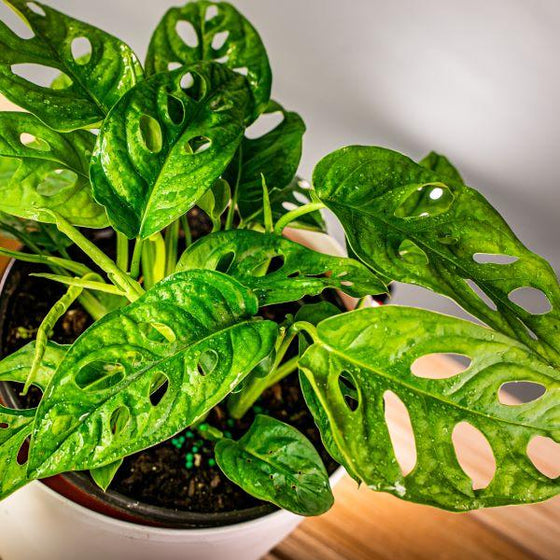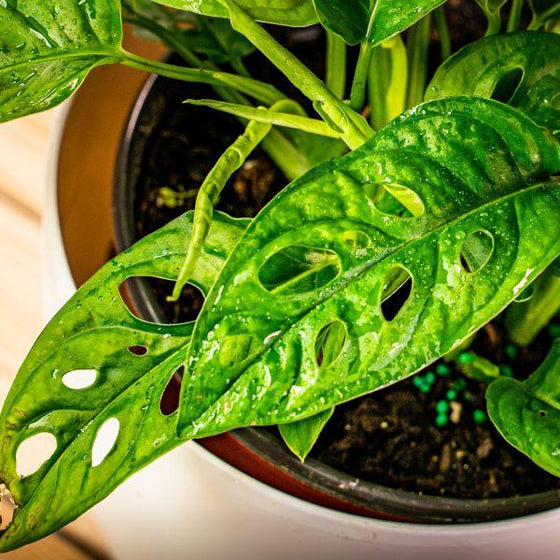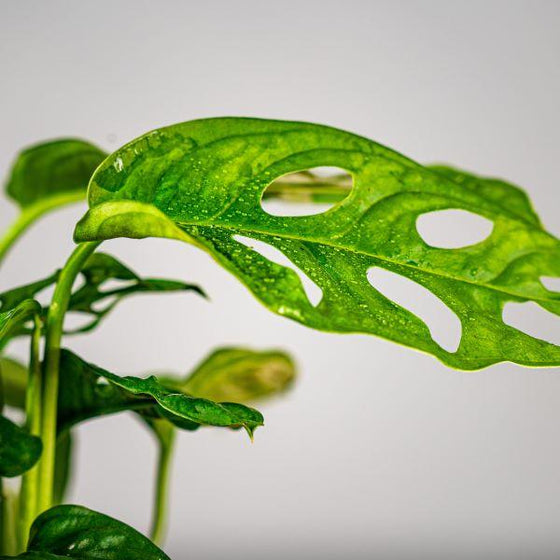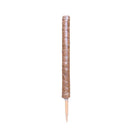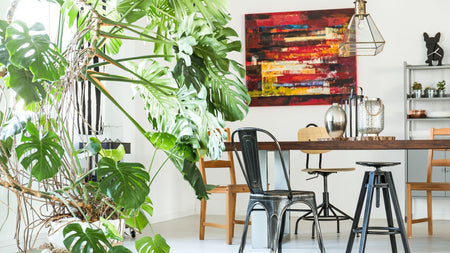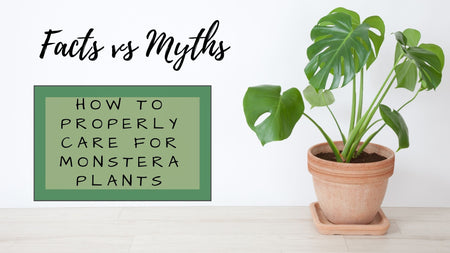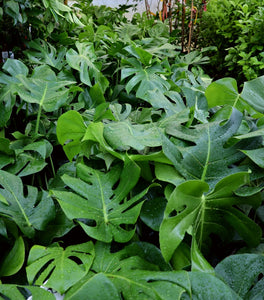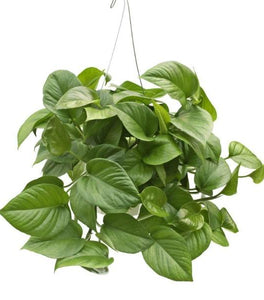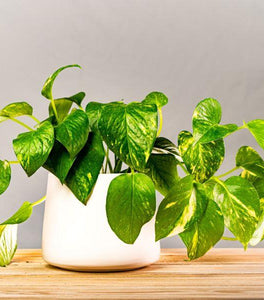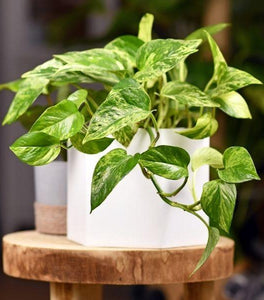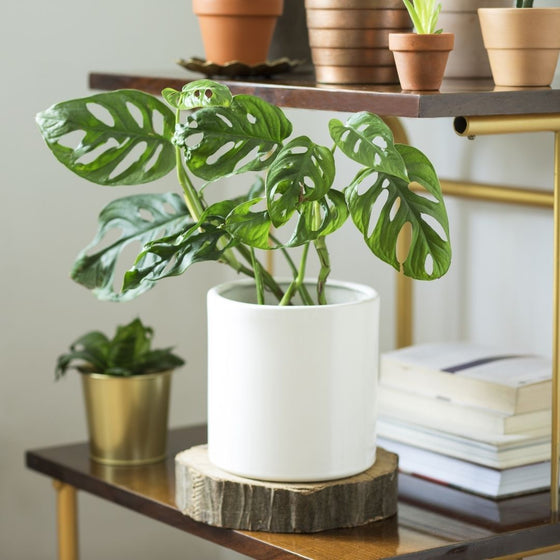
Images Depicted Range in Maturity & Container Size
Pots & Decorations Not Included Unless Otherwise Stated
A Playful and Lush Climbing or Trailing Houseplant
Distinctive Foliage with Natural Leaf Windows
Monstera adansonii, commonly known as the Swiss Cheese Vine, is renowned for its uniquely perforated leaves that develop artistic, oval-shaped openings as they mature. These fenestrations give the plant a lively, airy character, adding dynamic movement to indoor spaces.
As the vines grow, the foliage layers and drapes beautifully, making it ideal for bookshelves, hanging baskets, plant stands, and tabletops. Whether trailing downward or supported to climb upward, Monstera adansonii brings lush, rainforest-inspired texture to any room.
Thrives Indoors With Flexible Growing Options
This plant performs equally well as a hanging vine or a climbing plant trained along a trellis, pole, wall grid, or moss pole. As it climbs, the leaves grow larger and fenestrate more dramatically — making it a rewarding plant for collectors and beginners alike.
Its adaptable nature allows it to flourish in bright, indirect light, but it also tolerates medium-light spaces, making it suitable for apartments, offices, and interior rooms where direct sun is limited.
Easy Care and Beginner Friendly
Monstera adansonii grows quickly with simple routine care — modest watering, filtered light, and occasional pruning to shape. The plant’s growth patterns make it easy to propagate and share cuttings, adding to its popularity among houseplant enthusiasts.
While it prefers higher humidity, it adapts well to standard household conditions, making it a dependable choice for new plant parents.
Naturally Air-Purifying and Soothing to Live With
Like many Monsteras, adansonii contributes to cleaner indoor air by circulating and refreshing the atmosphere. The flowing, trailing vines soften interior lines and add organic warmth to contemporary spaces, creating a sense of ease and liveliness.
This climbing vine is on our list of 2020's Trendiest Houseplants.
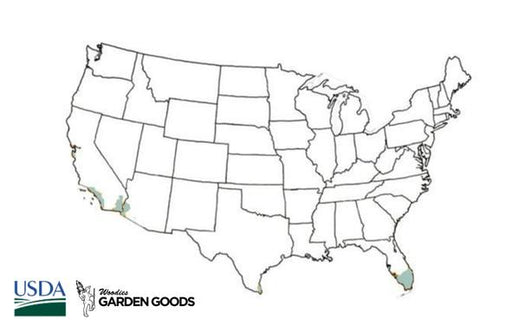
| Hardiness Zone: | 10–12; houseplant elsewhere |
|---|---|
| Mature Height: | 3–10’ trailing or climbing indoors |
| Mature Width: | 36 Inches |
| Classification: | Tropical Houseplant |
| Sunlight: | Bright to medium indirect light |
| Habit: | Trails or climbs with support |
| Flower Color: | Does not flower often |
| Foliage: | Dark green |
| Soil Condition: | Well-draining mix with perlite or orchid bark |
| Water Requirements: | Water when top 1–2” dry |
| Uses: | Hanging baskets, shelves, trellises, plant stands |
How to Care for Monstera adansonii (Swiss Cheese Vine)
Before you buy a Monstera adansonii Plant, make sure to read the recommended care instructions to keep this plant healthy and thriving for years to come!

How should I plant Monstera adansonii?
Choose a pot with drainage holes and a chunky soil mix — ideally one containing potting mix, perlite, and orchid bark for airflow. When planting, position the root ball level with the soil surface and water to settle. If you intend the plant to climb, install a moss pole or trellis at the time of planting so the roots can anchor early — this supports stronger upward growth and larger leaves.
How often should I water Monstera adansonii after planting?
Water when the top 1–2 inches of soil feel dry. Water thoroughly until excess drains, then empty the saucer. Consistent, moderate watering encourages steady growth and prevents leaf curl or dryness. In winter, reduce watering frequency slightly, especially in cooler rooms. If humidity is low, occasional misting or a nearby humidifier helps maintain lush foliage.
When should I fertilize Monstera adansonii?
Feed every 4–6 weeks during spring and summer with a balanced liquid houseplant fertilizer diluted to half strength. This supports fast growing vines and encourages new foliage with stronger fenestrations. Pause fertilization during winter dormancy or slower growth periods.

When and how should I prune Monstera adansonii?
Trim trailing stems to shape or maintain desired length. Prune just above leaf nodes to encourage branching and denser growth. Pruning also yields excellent propagation cuttings — simply place cuttings in water or moist soil to root.

